International Director Report: LOLA – 2015
![]() Print this Article | Send to Colleague
Print this Article | Send to Colleague
By Clark Rainer
GMIS International Director
It was a pleasure to represent GMIS International, along with GMIS International President Brian Kelley, at this year’s LOLA conference on November 17-21 in Antwerp, Belgium. All countries were represented with the exception of Australia; however, an overview was provided by proxy. Each organization gave an overview of activities from home countries. GMIS was excited to report about our Data Dive project, successful conference activity, and upcoming Accreditation program among other activities.
This year’s LOLA (Linked Organization of Local Authority – www.lola-ict.org) was hosted by V-ICT-OR in Antwerp Belgium, with a focus on "Digital Government". Keep that vernacular in mind, "Digital Government" – if you are not using this terminology in your day to day practice yet ... you should be.
Digital Government places data at the center of government operations and interactions between the government and citizens, between government and business, between government agencies, between governments. LOLA has several initiatives that fill a gap of creating standards whereby local government information can be shared between various governments, using various languages. In Europe a standard called the OSLO standard created for Flemish ICT organizations, and has been adopted by the European Commission. In the United States and Canada, we have the National Information Exchange Model or NIEM (www.niem.gov).
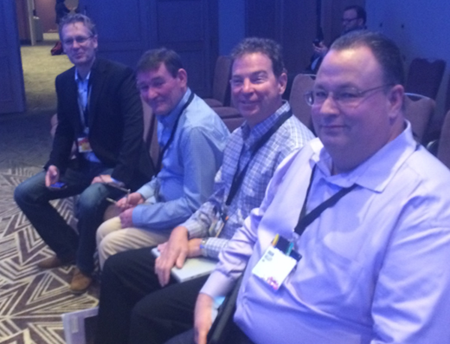
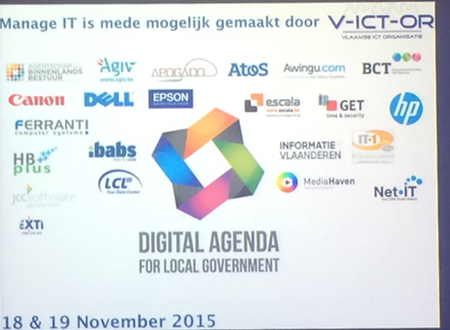
With the formalization of LOLA into non-profit organization last year, we are beginning to take on projects and seeking funding. Two projects were discussed during our LOLA meeting. The first was Innovative Open Education and Training based on PBL and Learning Analytics (ODEdu), a power point of this presentation and initiative can be found on the LOLA website at www.lola-ict.org.
This project is funded with an 80,000 (Euro) grant from the European Union, and ultimate goal is to establish a Knowledge Alliance between academia, business, and the public sector that will boost Open Data education and training. GMIS members will be eligible to participate in any training opportunities that arise from this effort as well.
The second project discussed was CityHive/SCOOP project, which would have provided a platform for member organizations to use as a data sharing tool. Unfortunately, this project missed funding by a few points. Expectations are that this will be re-applied for in the coming year.
Another project we are working on is creating a technician exchange program whereby GMIS members could have the opportunity to send a technician to another LOLA member country in exchange for one of their technicians. We are currently working on the details, but believe it would be a two to four week program. This is common place for law enforcement, legal staff, fire and rescue, staff to have a chance to learn from others abroad. We think this will be a great opportunity for GMIS members to give an opportunity to staff members to experience an IT Shop abroad, and gain the experience of having a visiting technician as well. Stay tuned for more information about his program in the coming year.
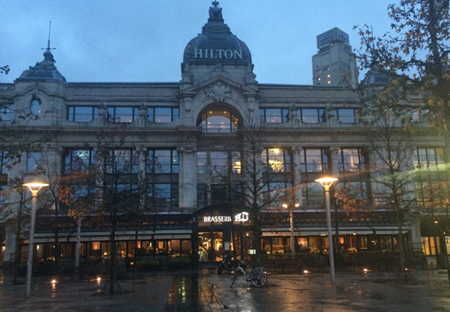
Wednesday and Thursday were general conference days and was well attended. Wednesday was more of a high level day, where Local Flanders Digital Government initiative called "Radical Digital Flanders" was presented by Kris Snijkers, Deputy Chief Cell Internal Administration Cabinet Minister Homans, and was followed by the European Commission, Deputy Head of Unity, Jean-Francois Junger with a presentation on eGovernment in the Digital Single Market Strategy. The morning session was wrapped up with a presentation by V-ICT-OR – Johan Van der Waal. The afternoon sessions were a deeper dive from the local, regional levels, followed by an intriguing case study of Antwerp and how they have been able to be innovative in attracting startup companies to address City problems.
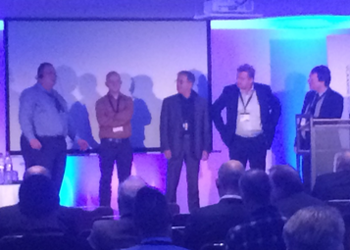
In the evening, we were treated to a private tour of the Antwerp City Hall, which is normally off limits to the public (only the Mayor and Council have access along with executive staff). The Deputy Mayor gave us a presentation on how important ICT and Digital Government has become in the City of Antwerp, and is central to the operation of the city.
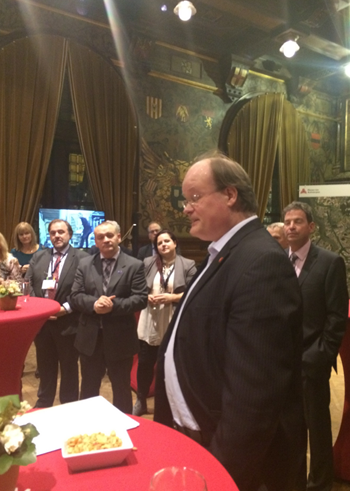
Following the reception at City Hall, we had a speaker and dinner where Menno Lanting, an expert on digital leadership. He compared today’s business cycles and how we run governments to many people driving speed boats; whereas, in the old industrial age of running governments to driving large oil tankers. Europe is going through quite a transformation, and privatizing a lot of things. They are becoming much more agile in their approach, and no longer view government as the solution to all problems. This is a fundamental shift to how I perceived Europe 20 years ago, when I first visited the continent.
The final day of conference presentations was started with a presentation from Danielle Jacobs, General Manager BELTUG – Chair INTUG on the common issues and opportunities from Digital Technology for local governments and companies. She discussed the European Digital Single Market, software licensing, the Internet of Things, and cloud and data privacy. All issues that were relevant to all of us.
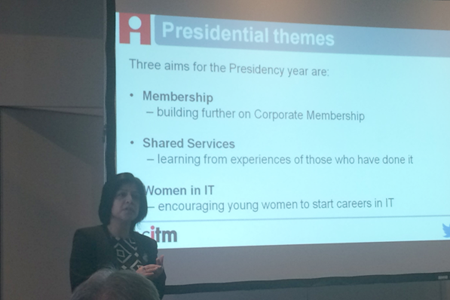
The remainder of the day was filled with Best Practices presentations by United Kingdom, Sweden, Netherlands, United States, New Zealand and Canada. We wrapped up with a LOLA workshop and ISA discussion of data sharing standards from the European Commission, and the use of Digital ID’s for all EU citizens. We can expect to begin hearing more and more about data encryption and the use of Digital IDs in the States!! Theater Dinner and the after party was a blast as well.
Friday the international guests were treated to a tour of Antwerp, the Cathedral, lunch, and a walk up to the top of the Res Star Line museum where we got a great view of the City. Friday evening we took a walk to an educational beer tasting. We felt especially safe with the extra security and had a chance to speak with a few of the troops.

Saturday was a little interesting. All the rail service was shut down by the Belgium government, and most of us were trying to get to Brussels airport. Luckily I was able to catch a ride with Hedwig Daineffe, who lived close to the airport and had some info from his police friends of how to best get to the airport. Mike Wanden and I took him up on his help to the airport, and luckily our flights departed just before the airport was closed.
